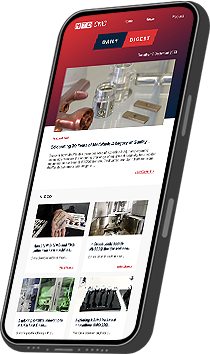
Advanced CT Scanning
Industry-leading computed tomography (CT) scanning technology provided by Nikon has been employed to uncover the secrets…

Specialising in the manufacture of precision components for the aerospace industry, subcontract machining firm Apel began investing in Citizen CNC turning centres in the 1980s to help raise efficiency. Founded in 1965, the company has over time continued to re-invest in modern, highly productive lathes purchased exclusively from Citizen Machinery UK.
Nowadays, Apel operates nine Cincom sliding-head lathes and one Miyano fixed-head model at its Wilmslow facility. Together they produce around 50,000 components per month across more than 3,000 part numbers. Utilisation of these Citizen CNC lathes and related technologies has led to significantly increased levels of productivity and profitability.
The technology that has contributed most to raising the efficiency of production at Apel is Citizen’s proprietary LFV (low-frequency vibration) chip-breaking software, which is part of the operating system in the control of three of the six 20mm capacity Cincom L20s on site. When activated, the function breaks what would otherwise be long, stringy swarf into short, manageable chips. Around 50% of the material processed by Apel is aerospace-grade stainless steel bar. LFV is especially effective when processing this alloy.
Paul Bowker, Apel’s Quality Director said: “We were an early adopter of LFV in 2018 following a visit to Citizen Machinery’s technical centre in Bushey to witness demonstrations. The function reduces the metal removal rate slightly, so we don’t use it all the time, but it’s really useful to be able to pick and choose when to program the function to start and stop. We switch it on mainly when turning stainless steel components on the LFV-equipped machines, especially when processing parts shorter than 25mm. It is normally chip breaking the metal for up to half of a typical cutting cycle.”
He further explained that the decision to use LFV is also based on the surface finish required on components. Some customers’ drawings stipulate a very high surface tolerance and machining with the LFV function switched on allows this to be achieved by turning alone. It avoids the need to centreless grind parts afterwards, thereby reducing unit manufacturing costs and raising profitability. Dimensional and surface finish tolerances on many component drawings can be met and maintained when using this facility.
Apel also uses Citizen’s adaptive guide bush (AGB) system. This automatically compensates for variation in bar diameter, preventing the stock from seizing in the bush. It also constantly maintains concentricity to prevent run-out issues. Downtime is avoided and tight machining tolerances are maintained. The system is used not only on the 20mm capacity sliding-head lathes but also on three 32mm capacity Cincom models on the shop floor.
The aerospace sector is very busy presently and Apel is well placed to win work due to the quality management system it operates, competitive pricing and the many industry and customer approvals it holds. Exports account for 20% of turnover with India and Saudi Arabia being major overseas markets.
The AGB systems ensure reliability during unattended operation by compensating for bar diameter inconsistency and preventing stoppages. Additionally, the LFV machines do not have swarf clogging the working area when processing stainless steel. It contributes further to reliability and eliminates the need for an operator to be in attendance to untangle ribbons from the components and tooling.
Mr Bowker concluded: “Our nine Cincoms, as well as the Miyano for turn-milling larger components up to 50mm diameter, support all of our production and will continue to do so as we increase our volume of work in the expanding global aerospace industry.”

Stay up to date with the latest industry news and events.

Be first to see all the updates from MTDCNC
Our newsletters frequency varies dependant on content
All the latest deals from the industry feature on our newsletters